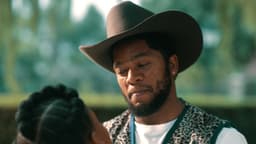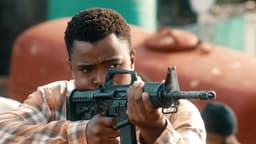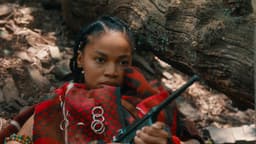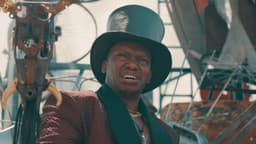
David Enright: SA's king of true crime on new documentary Stella Murders
David Enright established himself as South Africa’s king of true crime with Devilsdorp, the Showmax Original documentary series that was one of Showmax’s 10 most streamed titles of 2021, sold internationally and won the 2022 SAFTA for Best Made for TV Documentary. His second true-crime documentary, Stella Murders, is now streaming.
The feature-length Showmax Original documentary investigates the deaths of best friends Sharnelle Hough (17) and Marna Engelbrecht (16) at their hostel at Stella High School in North West. On Saturday morning, 26 May 2018, Sharnelle was found hanged by the staircase and Marna was discovered in a bathroom, with both deaths initially looking like suicides.
David was also head of content on Survivor SA: Return of the Outcasts, which became available to binge on Showmax at the start of March 2023.
We caught up with David to hear more about his love of reality TV and true crime.
Where were you born?
I was born in Upington but, at a very early age, I moved to Cape Town. So I say I am not born but bred in Cape Town. When I was about 12, we went to stay in the Netherlands for a year. My dad went to study his master’s in water management there. That made me reflect a lot on who I am. What does it mean being South African? What is this new culture I’m experiencing? That planted a seed in terms of my curiosity around psychology and human behaviour.
How did you get into filmmaking?
I had a big love for television and movies. When the first ever season of the American Survivor was released, it had a big influence in developing my interest in the industry. I realised I had, at least, some interest in the social experiment aspect of it, although at that stage of my life I didn't fully grasp it, but it also broke the fourth wall for me as a child and showed that television is something that is being made. When Survivor: Borneo came out, I went, “You mean you can do this as a job? And you can go to a tropical island?”
I hear you used to film your orals in high school at DF Malan in Bellville?
Yes, I also made the matric video: I’d film every big event and then I edited a compilation video at the end of the year. I actually made decent money off that, which showed me you can make money doing what you love.
It was also the time of the Bellville rock movement, with Fokofpolisiekar, Die Heuwels Fantasties and aKing. I think that showed me that there is a reward in taking creative steps, that there is hope in being an artist of some kind.
I knew I was kind of doomed to go into something creative. I always joke that I was dumb enough at that time to make my passion my work, but it is only meant in jest, as I really enjoy my work.
Did you study filmmaking?
Yes, after school I went to what was then known as the Cape Town International Film School, which then merged with CPUT and became their film and video section. To become a director of photography was initially the dream.
When did you shift to directing?
Early in my career I developed an interest for content. I realised filmmaking was about people, and that tapped into my interest in psychology, which was a hobby for me. I was given the opportunity to direct quite early in my career, on an adventure reality show called Challenge SOS, where we put high school kids in precarious positions, like abseiling or ziplining, and filmed it. It did really well; we won a SAFTA. But what was amazing to see was the growth that these kids were experiencing during the production of a reality series. It showed that there is a positive effect you can have on people, not only the people doing it, but also the viewers. You can inspire people. So I realised I really love working with real humans telling real stories.
So I had a choice to make. I wanted to be a DOP, but I was also really fascinated by directing and the content side of things. But then I found that in reality TV and documentary, there’s a niche for doing both.
Do you get paid twice, when you’re the director and the cinematographer?
[Laughs] It’s more like maybe 1.25. In South Africa, there are real limitations in terms of budget. But with reality shows and documentaries, sometimes you also want to be as intimate as possible, with very limited crew, so it’s actually an advantage. So in Devilsdorp, for example, I decided to shoot Ben’s retirement with just me and the sound guy, because I knew it was going to be intimate, and I didn’t want to bombard him with a lot of people around him. It was the same with the end sequence in Stella Murders.
How did you get into true crime?
My first true crime was a VIA show called In Ons Midde; Nina Swart was directing and I was helping out on camera shooting with Fahema Henricks. At that point, I realised I could handle the subject matter of true crime. We went through a lot of dockets and crime scene photos, and I said I’d take that over. I have an ability to compartmentalise, so that type of stuff doesn’t traumatise me. It affects you to some degree - obviously, I'm still human - but I can put it in its box and compartmentalise it.
I was intrigued by true crime, because it’s about human behaviour and it feeds my inherent curiosity. But my wife, Lauren, is a huge true crime fan. And that’s probably an understatement and a big reason why I am so up to date with the genre. So I’d been following the evolution of true crime. I think 2015 was a key moment; it felt like documentary, thanks to HBO and Netflix, had a bit of a resurgence, with stuff like The Jinx and Making a Murderer.
Then during the pandemic, I was lucky enough to have a little bit of work early on. But then there was definitely a big chunk of nothingness, a few months when the television industry shut down. So in an attempt to find purpose, I started researching construction and how to upgrade our backyard. And while doing the work, we spent a vast amount of time listening to true crime podcasts.
So unknowingly that time prepped me to be very in touch with how true crime as a genre evolved. Initially it was always about the crime and the murderer, and people accidentally put them up on a bit of a pedestal and romanticised the idea of people like serial killers. So a lot of the criticism from the audience was that the voices of the victims weren’t being heard. Reading comments and reviews, I could see that resistance building up. That was the big shift for me: that the genre can’t just be about the events, the murder, and this is how it happened. It has to be more than that; you have to allow the audience more insight into not only the accused, but also the events, the geography, and the experiences of those involved, while giving the victims back their voices.
And then at the end of 2020, I got a call from Devilsdorp’s co-creator, Kristen Broberg. She’d done the research and development and identified me to take over and direct the documentary. I actually said no, because I had another job. She said, ‘I totally get that; it’s 100% on brand; you’re very loyal.’ But then she still tried to convince me, and I said, ‘Okay cool, just give me the weekend to ponder on it.’ And then I consulted with my wife, and she said, ‘You know what: I will always be supportive of your dreams - but I really like true crime. Can you please make a show for me to watch for a change?’ That is a plea one takes seriously. So when Kristen phoned back, I said yes.
How did your life change after Devilsdorp became such a phenomenon?
We knew we had a good show. I was very proud of it. But I must be honest: I was very overwhelmed actually by how well it did, but in a good way. I expected it to do well with the Afrikaans market and a bit of the English market but the way it crossed so many demographics was mind-blowing, actually. You do feel a sense of accomplishment and pride, although you do always evaluate, ‘Okay, cool, what could I have done better?’
But the funny thing about it was I said, ‘I'm just gonna take a bit of a mental health break after Devilsdorp’. But because it did so well, people thought I was unattainable and unaffordable, so my phone stopped ringing. I didn't mind it for the first month, but then I was like, ‘Well, I still have to pay my mortgage.’ Luckily I’d developed a network and friends in the industry, so I was like, ‘Listen, I am still in South Africa and also I'm available.’ And then after that, I did a few small things just to get going and then jumped on Survivor again.
It was my fourth Survivor but my first as head of content. So it was a dream job, and it felt like a full circle moment, since watching Survivor: Borneo is where my interest in filmmaking started.
What attracted you to Stella Murders? Why did you want to direct this documentary?
I had to give that a lot of thought. The initial pitch was from the perspective of the accused and involved investigating some conspiracy theories, but the research showed none of those held water. So when IdeaCandy brought me on board, I said, ‘Okay cool, but we have to reevaluate.’ There is a lot of intrigue in the story, but we focused on capturing the emotion and impact rather than lots of sensational twists like in Devilsdorp. To allow Stella Murders to hold value and deliver on intrigue, we needed to step out of the usual true crime recipe, so credit to Showmax and IdeaCandy for giving me the support to do it ethically and respectfully, rather than looking for sensationalism.

How hard is it to convince people who’ve been through something like this to appear in a documentary?
It is really difficult. At one stage, someone put one of the letters we’d written on Facebook saying, ‘Can this just stop?’ With my name and personal phone number. And then someone else came back to say they didn’t agree with making a documentary, because it’s slimy to tell a story like this for commercial gain. That makes you ask: ‘Am I just doing this as a job, for commercial gain?’ So we had some heavy discussions. It became important for me to prove the doubters wrong.
We were told that Sonja Hough, Sharnelle's mother, would be one of the most challenging family members to get to. But I was able to get hold of her and she agreed to let me come see her. No cameras; just me, her and assistant producer Minette van der Walt, providing crucial support and compassion. And Sonja was then very influential in getting the others to talk to us.
I went to Stella and spent a week in the area, praying that they could meet me, because it’s easier when they put a face to a name. I think people appreciated that we took that effort.
Sonja’s interview was quite early on in filming. The next morning, she sent me a message to say, ‘Thank you, David. We are experiencing laughter this morning. Yesterday felt like therapy.’
That helped me personally, to feel like, ‘Okay, now I can do this. We can add value to people’s lives.’
Talking is the most powerful thing. Having someone listen; it’s extremely powerful. There is something truly profound that happens when experiences are shared.
We saw that with other interviewees too; when we went back a second time, we could see improvements, people had done things they’d been putting off.
How do you create the trust needed for people to open up?
It’s a very intuitive process. It’s easier when your intentions are pure. People can sense maliciousness and insincerity from a mile away; one should never underestimate that ability in anybody. So you have to build a foundation and an approach that you can be truthful and honest about. So I normally try and reflect on what value the production can bring. Why do we do this? I need to know that there's a reason and never lie about it, so I can truthfully tell the person, ‘This is where we are coming from.’
Then I always say, and again this is oversimplifying it vastly, that there are two possible outcomes. Either the person will speak or the person won't speak. The only reason why somebody will speak is not because of you; it’s because they have a reason to speak, whether it’s to get the truth out there or to prevent similar tragedies. You just help guide them into understanding that yes, there is value in speaking, and I can help facilitate that if you take on the journey of trust with me. So I’m often trying to just have them on the phone for as long as possible, or at the coffee shop for as long as possible, to find that reason, and to just see if a reason exists. If it doesn’t, if they have no agenda, or don’t think they’ll add value, or get value, they probably won’t speak. Then there's nothing you can do. So if they don't want to do it, if they’ve decided, then it doesn't matter how good you are, you won't get them. Maybe some other genius can do it but I know my limitations.
But you still need to be a story bulldog. So, there’s also a part of me that wants to go like, ‘If we get an exclusive interview, that’ll be really good for Showmax and the documentary.’ But there is a threshold I won’t cross.

You tell stories about real people, which comes with responsibilities. What’s the key to doing that ethically?
I always keep the project in mind, but, knowing that people are going to give me openness and vulnerability, that comes with ethical responsibility I take very seriously. It’s great to work with producers Wim and Elle at IdeaCandy, because they also agree that everything has to be done ethically.
I always try and give back something to those brave enough to share their stories, so that whatever we film benefits them as well. Whether it is as little interference as possible. Or not creating an intimidating environment. Or if I take them down a dark road, I'll make a lot of effort to make sure I bring them back from that, safely and respectfully.
You also have to keep track of your promises.
Why do you think the Stella Murders case resonated across South Africa?
Unfortunately, two teenage girls being murdered isn’t unique in South Africa, but this happened in a small town, where there is a strong perception of safety, and at the school hostel, a place where parents expect their children to be safe. I think that’s part of what makes it so shocking.
Why should South Africans watch Stella Murders?
Stella Murders is in some ways a portrait of grief and community. The trauma that these families experienced firsthand is a microcosm of what South Africa is also experiencing. We often neglect to allow ourselves to grieve. The irony is that when we allow ourselves to fully experience our emotions and work through them, we lessen the grip they hold on us. There is a catharsis of some kind. That’s what I hope Stella Murders can facilitate for the audience. A good cry usually helps, and I think most South Africans need a good cry right now.
Stella Murders starts streaming on Showmax from Friday, 17 March.
More like this

Must-watch trailer: The People vs VBS explores South Africa’s biggest bank heist
The People vs VBS is IdeaCandy's true-crime docuseries on South Africa’s biggest bank heist. On Showmax from 25 March and on M-Net from 2 April.

Brakpan Chronicles S1
What is true about the town of Brakpan and what is fiction? Do the jokes about this place have any basis in reality? In this two-part documentary, we aim to find the real Brakpan, the place that exists beyond the memes.

South Africa’s stories and storytellers recognised as SAFTA nominees announced
Mzansi’s boldest stories take centre stage as the 2026 SAFTA nominees are unveiled, with a wave of nominations across DStv and Showmax.

Billy Joel: And So It Goes (2025)
An honest, insightful, and deeply moving look at the life and career of acclaimed musician Billy Joel, covering both his struggles and triumphs.

Surviving Mormonism with Heather Gay S1
Former RHOSLC cast member Heather Gay investigates hidden truths within the Mormon church, exposing cracks in its perfect facade.

Brakpan Chronicles: Die mense sê, kom in
The two-part documentary series Brakpan Chronicles, by Rian van Heerden and Provoco, will premiere soon on Showmax.

Wizkid: Long Live Lagos (2025)
This intimate and uplifting documentary explores Grammy-winning Nigerian artist Wizkid's rise to superstardom as one of the biggest Afrobeats artists.

Law & Order Toronto: Criminal Intent S1-2
This spin-off of the hit crime drama franchise follows an elite squad investigating corruption and high-level white-collar crime in Greater Toronto.
Outlaws, now streaming on Showmax
Go on holiday with RHUGT: Africa
More must-watch documentaries

Must-watch trailer: The People vs VBS explores South Africa’s biggest bank heist
The People vs VBS is IdeaCandy's true-crime docuseries on South Africa’s biggest bank heist. On Showmax from 25 March and on M-Net from 2 April.

What to watch on Showmax in March 2026
Local gems, Showmax Originals, international hits and intriguing documentaries await Showmax viewers in March.

Dangerous Animals (2025)
A tense, twisted and jaw-dropping survival horror. When a surfer is abducted by a shark-obsessed serial killer, she must escape before he performs his sadistic shark feeding ritual.

The Neighborhood S1-8
When Dave Johnson and his family arrive from Michigan, they're unfazed that their new dream home is located in a community quite different from their previous small town.
Latest Stories

What to watch on Showmax in March 2026

Bad Girls Bootcamp S1

Nhlanhla Kunene confirmed for Law, Love and Betrayal Season 2

Christall dishes on The Real Housewives Ultimate Girls Trip

Brakpan Chronicles: Die mense sê, kom in

Schalk Bezuidenhout trades stand-up for 9-5 in Die Kantoor

A heartbreaking loss: Nolwandle Biyela’s final stand in Outlaws Season 2

Fall in love with romantic drama Touch, now on Showmax

Antonie Marx on Volspoed and why it's a must-watch

Sandra Stein makes her debut on Law, Love and Betrayal S2

Albert Pretorius on Die Kantoor, SA’s re-imagining of The Office

20+ addictive South African reality shows to stream

Where to watch The Real Housewives franchise online

How to Train Your Dragon: Bringing Hiccup and Astrid to life

What to watch on Showmax in January 2026

7 things to know about indie award-winning movie Dìdi

Mission: Impossible – The Final Reckoning’s South African stunts

Die Kwiksilwers (2024)

Where to see the cast of Mpondoland on Showmax

Angel on The Real Housewives Ultimate Girls Trip, Jojo and more

Thandolwethu Zondi on his new role in Outlaws S2
Must-watch trailer for Showmax's turbo-charged reality series Volspoed

The Real Housewives Ultimate Girls Trip cast on first impressions, beefs and more

Fana Mokoena on playing a sangoma in Masinga







